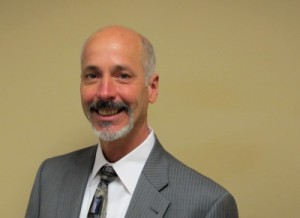State Health Exchange Advocates Say Jobs Hang In The Balance

Molly Messick / StateImpact Idaho
Rep. John Rusche (D-Lewiston) wants to see Idaho establish its own health insurance exchange.
Under the federal health care law, states are charged with deciding whether to establish their own health insurance exchanges. Those exchanges are often described as transparent marketplaces where people will be able to purchase health insurance. States including Utah and Nevada have already established their own exchanges. In Idaho, lawmakers will come to a verdict this session. As they prepare for the debate, advocates of a state-based exchange say local jobs are at stake.
State Health Exchange Advocates Say Jobs Hang In The Balance
In the Idaho Legislature, there’s no shortage of fighting words about President Obama’s health care law. Rep. Vito Barbieri (R-Dalton Gardens) had this to say at a legislative preview event last week. “This healthcare mandate is not good for the nation. It’s socialism. A socialist America is a broken America.”
On principle, Barbieri would have state lawmakers refuse the more than $20 million dollars in federal grant funding set aside for the creation of a state-based health insurance exchange. That’s one view. At the other end of the spectrum are those who believe that establishing an Idaho-based exchange is the only sensible route. House Minority Leader John Rusche (D-Lewiston) falls into that camp. For Rushe, a medical doctor who spent half his career as a health insurance executive, the real story of what’s at risk can be found amid the tidy cubicles of a Blue Cross of Idaho call center near Boise.
It’s a place that brings together two things that Rusche thinks could be endangered, if Idaho chooses not to build its own exchange, and instead defaults to a federal model. Those two things are local jobs, and local customer service.
In Idaho, the individual and small group health insurance market is mostly served by two, Idaho-based, not-for-profit insurers — Blue Cross of Idaho and Regence BlueShield of Idaho — as well as regional insurer PacificSource. Together, those companies employ just under 2,000 people in the state. When Idahoans insured by one of those companies have questions about their benefits, their calls are answered by someone in Idaho. Rusche fears that under a national exchange, that system that employs local people and provides local accountability might not hold up. To understand why, think about what Rusche believes a national health insurance exchange could look like. “What I expect will be happening is there will be five, six, seven, eight carriers in the national exchange,” he said. “I think they will have kind of a restricted exchange, and they may actually make them bid for their position in the exchange. Our local companies, our domestic companies just can’t compete in that world.”
In other words, Rusche believes a national exchange will favor larger insurers. What’s the result for Idaho’s existing companies? “I think it will be significant, significant reductions in the size of the companies,” Rusche said. “I think there will be job loss.”

Molly Messick / StateImpact Idaho
Shad Priest is a former deputy director of the Idaho Department of Insurance.
It’s a worry that isn’t hard to find, among those who want the state to create its own exchange. Department of Insurance Director Bill Deal has expressed it. And Regence BlueShield’s Shad Priest also doesn’t think Idaho’s insurers can expect to compete in a national exchange. “The federal government is operating under the same time constraints that Idaho is,” he said. “They have to have this up and running by 2014. That’s a really short time to put something this complex into place.”
Given that, Priest believes he knows what a national exchange will look like. “In my view, they’re going to have to come up with a one-size-fits-all approach, and I don’t think an exchange that’s designed to work in Florida, that’s designed to work in Louisiana, is necessarily going to be the best solution for the people of Idaho,” he said.
Alan Weil, Executive Director of the nonpartisan National Academy for State Health Policy, says predictions like this are hard to check. The federal government has said little about how it will structure a national exchange. “Really, all we know is that under the law, the federal government will establish and operate an exchange in any state that chooses not to build one,” Weil said.
That means we don’t know key things about the national exchange, like what its approach will be to selecting the plans that can participate. Still, Weil says he doesn’t believe a national exchange will exclude local insurers. After all, health insurance exchanges are supposed to be marketplaces. Weil says it wouldn’t make sense for those creating the national exchange to build the kind of one-size-fits-all model that Rusche and Priest fear. “They’re not going to pick a plan that doesn’t do business in the state and hand them everyone’s business in the state,” Weil said. “That’s not what the exchange does. What I do think is that they’re likely to establish conditions of participation that are based on national norms and maybe not Idaho norms.”
And that, Weil says, could make the competition tougher for Idaho’s existing insurers. Given these divergent views about the composition and effects of a national exchange, it’s a small wonder that Idaho insurers want the relative predictability of a state exchange. Steve Tobiason, General Counsel of Blue Cross of Idaho, says controlling the exchange locally is the best way to minimize all of the uncertainties. “If you had a state exchange, we know we would participate,” he said. “If you had a federal exchange, we may not be able to participate. We don’t know. And if we want to eliminate that risk, it’s a state exchange. In one sense, it’s that simple.”

Molly Messick / StateImpact Idaho
Blue Cross of Idaho General Counsel Steve Tobiason says a state insurance exchange is the least risky option for Idaho insurers and residents.
But how about the best interests of Idaho residents? Do they dovetail with the best interests of Idaho insurers? Tobiason says yes. “Idaho typically wants to solve their own problems and not have somebody else solve it for them. If the various players – legislature, industry, business, consumers – can sit down and say, ‘This is how we think it ought to look,’ then you’ve got something that’s going to work for this marketplace, and there’s no guarantee that that’s how it will look under a federal exchange.”
A local exchange, he says, will be more accountable to local people. Whether the legislature at large will be persuaded by this argument – that story will be told by the session ahead.

